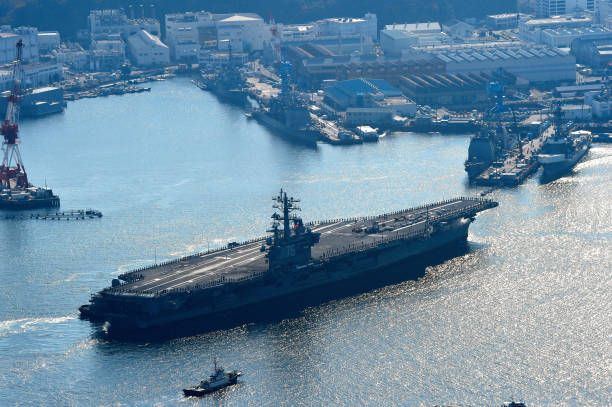US Admiral Who Led Carrier Through Nine-Dash Line Praises Chinese Professionalism

United States Navy Rear Admiral George Wikoff has praised the “professionalism” of the Chinese navy during an encounter with them in disputed regions of the South China Sea. He has described the interactions as “cordial” as the Nimitz-class, nuclear-powered supercarrier USS Ronald Reagan, one destroyer and two cruisers passed through the region that China has claimed control of.
The U.S. does not have any sovereignty claims in the South China Sea, but it does have many allies, including Japan, South Korea, Philippines and Taiwan. It is on good terms with Vietnam, which is under one-party Communist rule as China is.
The U.S. often conducts “freedom of navigation” exercises that are aimed at countering China’s encroachment into the disputed waters. The “disputes” are primarily over oil and gas reserves that are located within the exclusive economic zones (EEZs) of the smaller countries but to which China claims as being within its Nine-Dash Line, a U shaped demarcation line that includes the bulk of the South China Sea.
None of the other countries can compete with China’s military and naval forces. There have been many instances of China acting aggressively to have its way with its oil and gas explorations and to build-up its military. China claims these are defenses against American and foreign intrusion.
The U.S. Navy’s Task Force 70, along with the 7th Naval Fleet based in Japan, provides ample motivation for China to think hard about any action it is considering. In this case, the USS Ronald Reagan supercarrier and the rest of the task force were bound for Singapore, passing by areas of the Malaysian Coast. These areas are of interest to China to expand its territorial waters and assert control over maritime navigation.
Admiral Wikoff commented further, “They remain respectful in accordance with what we anticipate a professional would do, and we respond or initiate in kind when we believe that there is a situation. It has been very cordial, and I think they have been very professional. This is really what I’d like to emphasize on both sides.”
U.S. Naval officials are taking a keen interest in Chinese antiballistic missiles and unmanned drones. The U.S. considers these as “anti-access/area denial” countermeasures against U.S. strike capabilities in the region. In turn, the Chinese Ministry of Defense has criticized recent U.S. Navy actions by saying it is “flexing its muscles in the region.”
Embroiled in a bitter trade war with the U.S, it may be that China’s cordial behavior is similar to how a high-society lady might feel when she discovers her rival wearing the same gown at a gala event: smiling on the outside but simmering inside.
© Copyright IBTimes 2025. All rights reserved.





















